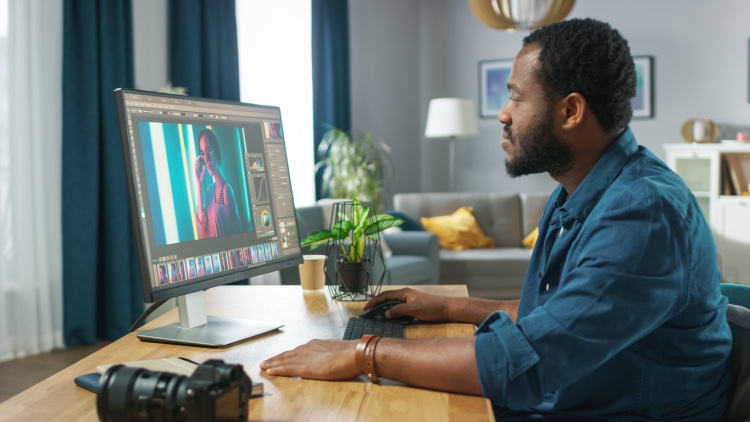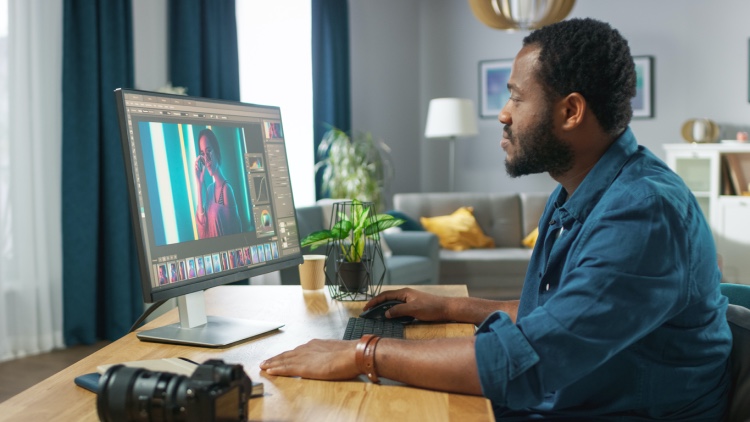UX Designer vs. Graphic Designer: Breaking Down the Difference

Both user experience (UX) designers and graphic designers work with the primary elements of visual design to bring the digital world to life. However, it is important to note the differences between the two roles when considering a career as a UX designer versus a graphic designer. The former creates an experience for the audience through design, while the latter communicates a message through design.
While recognizing the distinctions between these two positions is important for potential students, both UX designers and graphic designers can begin a path to an exciting career by pursuing higher education. An excellent place to start is to explore the online Bachelor of Fine Arts in Digital Media from Maryville University. With a curriculum focused on the history of design and the modern role of digital media, the program provides students the opportunity to cultivate knowledge and skills that will serve them well in either career path.

UX Designer Overview
The primary goal of a UX designer is to shape the experience an audience feels when interacting with a piece of software, a website, an application, or other product. UX designers must incorporate logic and reasoning skills into their work as well as data analysis. Before creating a design, UX designers use data tools and research methods to learn about potential consumers and competing products. Then, they construct a wireframe design; a basic prototype or two-dimensional illustration of how they plan to convey a certain feeling through the visual, audio, and tactile presentation of certain ideas.
UX designers may sketch wireframes by hand or use tools to create interactive high-fidelity wireframes. Wireframes are an essential design step, because they are the basic blueprints for whatever is being produced — websites, digital projects, user interfaces, mobile applications, and more.
After a wireframe is agreed upon, coding the digital design comes next. While it isn’t necessary for UX designers to completely code their designs, it is important for them to have some coding skills. After the design has been coded and launched, UX designers analyze the design to see if it is producing the intended effect on the audience and achieving the desired result of selling a certain service or product.
UX Designer Job Outlook
Trends in UX design careers often correlate with various societal trends inside and outside the technological field. UX designers both influence, and are influenced by, the attitudes and behaviors of consumers. UX designers should be aware of how cultural perceptions, societal shifts, and individual experiences all inform each other — and then design products accordingly.
Because designs influence cultures and cultures influence designs, the role of the UX designer is important and will continue to be so as technology evolves. According to the Onward Search Digital, Creative and Marketing Professionals Salary Guide, UX designers were the second most in-demand job in 2019.
Graphic Designer Overview
The position of graphic designer is more familiar to most people. Graphic designers use colors, typography, text, and images to communicate a message through visual design. Graphic design jobs tend to be associated with branding and marketing, as many graphic designers are hired to design advertisements for products. When creating the overall aesthetic of a design, graphic designers make myriad choices. For example, they must choose between bold or soft colors, select or create type fonts, and create illustrations. Among other formatting choices, graphic designers also decide whether an image will be asymmetrical or symmetrical and minimalistic or extravagant. Graphic designers may create their visual messages by hand or use computer software.
Graphic Designer Job Outlook
The U.S. Bureau of Labor Statistics (BLS) projects job opportunities for graphic designers to grow 3% between 2018 and 2028. Graphic designers who understand coding and can code their own designs can give themselves a competitive edge.
Concept Similarities
While it is important to understand the role of a UX designer versus a graphic designer, the two roles do have several similarities. UX and graphic design share the following requirements and skills:
- Both typically require a bachelor’s degree in a field related to graphic design or digital media
- Both require storyboarding, communication, programming, and design skills
- Both must have a well-developed knowledge of graphic-based computer software and systems
- Both require a basic understanding of coding, SEO, and copywriting
- In addition to technological ability, both require strong creative, analytical, and communication skills
Concept Differences
While UX designers and graphic designers can begin their careers with the same degree, there are key differences.
- UX designers create and develop systems that drive tech-focused interactive products, with the goal of enhancing the user experience. Graphic designers, on the other hand, develop visual concepts to target an audience that is potentially interested in a specific product.
- The work of UX designers will commonly manifest itself in concepts such as phone apps or wearable technology.
- UX designers are also becoming more prominent in the VR (virtual reality) scene. While graphic designers can also work with advancing technology, their work typically surfaces in illustrations for marketing or corporate branding. UX designers usually require a greater depth of technical computer systems knowledge.
- UX designers typically earn a higher annual salary than graphic designers. According to December 2019 PayScale data, graphic designers earn a median salary of $44,476, and UX designers earn a median salary of $74,083.
UX Designer vs. Graphic Designer: Which Is Right for You?
As technology and design evolve, the need for both UX designers and graphic designers continues to grow. Students who are pursuing careers in either role can learn the foundational skills they’ll need through the Maryville University online Bachelor of Fine Arts in Digital Media.
Students in the program are taught storyboarding, communication, programming, and design. They begin to build their design portfolios and develop other key skills and competencies. Individual classes include Foundational Design, Visual Thinking, Website Design, and UX/UI Design, among others.
Learn more about how Maryville University can help you pursue a career in UX design or graphic design.
Recommended Reading
The Future of Media: Concepts and Trends for Communication Professionals
The Role of Designers in the Future of Advertising
What Does the Future of Advertising Look Like?
Sources
CMSWire, 13 Must-Have User Experience (UX) Design Skills
Entrepreneur, 10 User Experience Design Trends You Need to Know About in 2019
Forbes, Six Graphic Design Trend Predictions for 2019
G2, “38+ Powerful Virtual Reality Statistics to Know in 2019”
Houston Chronicle, What Graphic Design Skills Are in High Demand?
Maryville University, Online Bachelor’s in Digital Media
Medium, “Incorporating UX in Virtual Reality”
PayScale, Average Graphic Designer Salary

